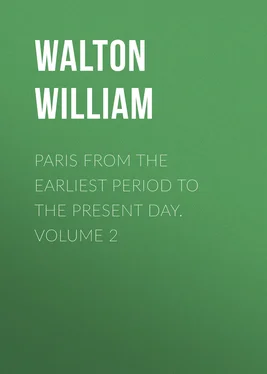William Walton - Paris from the Earliest Period to the Present Day. Volume 2
Здесь есть возможность читать онлайн «William Walton - Paris from the Earliest Period to the Present Day. Volume 2» — ознакомительный отрывок электронной книги совершенно бесплатно, а после прочтения отрывка купить полную версию. В некоторых случаях можно слушать аудио, скачать через торрент в формате fb2 и присутствует краткое содержание. Жанр: Путешествия и география, История, foreign_edu, foreign_antique, foreign_prose, на английском языке. Описание произведения, (предисловие) а так же отзывы посетителей доступны на портале библиотеки ЛибКат.
- Название:Paris from the Earliest Period to the Present Day. Volume 2
- Автор:
- Жанр:
- Год:неизвестен
- ISBN:нет данных
- Рейтинг книги:3 / 5. Голосов: 1
-
Избранное:Добавить в избранное
- Отзывы:
-
Ваша оценка:
- 60
- 1
- 2
- 3
- 4
- 5
Paris from the Earliest Period to the Present Day. Volume 2: краткое содержание, описание и аннотация
Предлагаем к чтению аннотацию, описание, краткое содержание или предисловие (зависит от того, что написал сам автор книги «Paris from the Earliest Period to the Present Day. Volume 2»). Если вы не нашли необходимую информацию о книге — напишите в комментариях, мы постараемся отыскать её.
Paris from the Earliest Period to the Present Day. Volume 2 — читать онлайн ознакомительный отрывок
Ниже представлен текст книги, разбитый по страницам. Система сохранения места последней прочитанной страницы, позволяет с удобством читать онлайн бесплатно книгу «Paris from the Earliest Period to the Present Day. Volume 2», без необходимости каждый раз заново искать на чём Вы остановились. Поставьте закладку, и сможете в любой момент перейти на страницу, на которой закончили чтение.
Интервал:
Закладка:
The whole administration of the State was reorganized and given that character of "centralization," apparently rendered necessary by the danger from abroad by which it was threatened, which is still maintained, notwithstanding the many evils to which it has given rise and the extent to which the public liberty is impaired. Under the able hand of the First Consul, the new government was quick to inspire such confidence that the Parisian bankers lent it readily the first funds of which it had need. The laws against the recalcitrant clergy were greatly modified, the churches opened, the list of the émigrés was declared closed, and the former nobles admitted to their rights as citizens, but not to the enjoyment of their property which had been confiscated for the benefit of the biens nationaux . The Parlement of Paris having been suppressed, a new judiciary organization was established in the capital, the tribunal de première instance and the cour d'appel were created; the cour de cassation and the cour d'assise , the justices of the peace, were all reorganized. The army, strongly revolutionary in tendency, was so willing to be relieved of the incompetence of the Directory, and was so promptly provided with equipments, munitions, and confidence in the new order of things, that it willingly accepted the change in the State.
Marengo and Hohenlinden brought about the Peace of Lunéville, February, 1801, with the Continental powers; the fear of the camp of Boulogne from which the First Consul proposed to descend upon England (if we may believe the French historians), that of Amiens, March, 1802, with that power. The wars of the Revolution were finished, it was thought, even by Bonaparte himself. Then commenced that extraordinary display of the genius of reorganization, unhampered by any undue scrupulousness, which made his legislation almost as admirable as his military talent; the nation willingly resigned itself into his powerful and most skilful hands, and the machinations of the royalists against his life, the conspiracies and the infernal machine of 1800, only paved the way to the Consulate for life, 2d of August, 1802. The Empire followed on the 18th of May, two years later.
The name of the Republic, however, was retained long after its substance had departed. The title of Emperor appears as early as 1790, in a proposition made by M. de Villette on the 17th of June, before the club of 1789, that the king should be saluted by that title on the day of the fête of the Federation. "Let us efface," he exclaimed, "the names of king, of kingdom, and of subject, which will never combine with the word 'liberty,'" Empire signified, under the monarchy as under the Republic, rather the extent of the territory of France than a form of government. The first article of the sénatus-consulte organique of the 28th Floréal, year XII, which modified the Consular constitution, read: "The government of the Republic is confided to an emperor who shall take the title of Empereur des Français ." And the Emperor's oath was: "I swear to maintain the integrity of the territory of the Republic." The word République did not disappear entirely from the official language for four years. The figure of the Republic ceased to appear on the seal of State in 1805, and the inscription RÉP. FRA. from the official stamp on the news journals on the 1st of January, 1806. It was on this date also that the Gregorian calendar replaced that of the Republic. The decree of the 28th of May, 1807, is the last act of the Imperial government in which appears the phrase par les constitutions de la République , but it was only from the 1st of January, 1809, that the coinage was stamped Empire Français , instead of République Française . It would seem that in 1808, Napoleon, little as he liked the Republic, was the only one who remembered its official existence.
Among the most efficient of the minor measures taken to replace the old order of things by the new was the creation of a new honorary order, to supersede those of the ancient régime,—the cross of Saint-Louis, for military services; the cordon of Saint-Michel (cordon noir), for civil services; and the order of the Saint-Esprit (cordon bleu), which included only a hundred chevaliers, of the most ancient nobility. A law of May 19, 1802, created a Légion d'honneur , to be composed of a grand administrative council and of fifteen cohorts, each consisting of seven great officers, twenty commandants, thirty officers, and three hundred and fifty legionaries. By the eighth article of this law, every individual admitted into this Legion was to swear on his honor to devote himself to the service of the Republic, to the preservation of its territory in all its integrity, to the defence of its government, of its laws, of all property which it had bestowed, to combat, with the aid of all the means which justice, reason, and the laws authorized, every enterprise tending to re-establish the feudal régime, to revive the titles and qualities which had been its attributes,—in short, to aid with all his power in the maintenance of liberty and equality. By the denial of any hereditary privileges it was thought thus to create an order which would not offend the new spirit of equality while offering a suitable reward to the soldier, the diplomat, the scientist, the professional or the commercial man who had rendered notable service to his country.
"The Empire succeeding the Republic," says M. Steenackers in his Histoire des ordres de chevalerie , "brought about certain changes in the Legion of Honor. In the first place, the form of the oath had to be modified, and was refused by certain men, such as the admiral Truguet and the poet Lemercier. The first distribution made by the Emperor, on the 14th of July, 1804, in the church of the Invalides, to the principal personages of the Empire, was again made the occasion of a manifestation of opposition by Augereau, although a grand officer of the order, and of about sixty military officers who remained in the court, not wishing to enter the chapel. In this distribution, the old invalided soldiers came first, then the members of the Institute, and finally the military legionaries. The youth of Paris also made its small protestation, some days after this distribution. It was the season for carnations,—the young men put these flowers in their buttonholes and thus were enabled to receive, at a distance, military honors from functionaries a trifle near-sighted. Napoleon, informed of the jests which ensued, and of the discontent of the soldiers, ordered the minister of the police to take the most severe measures with regard to these insolents. Fouché replied: 'Certainly these young people deserve to be chastised, but I will wait for the autumn, which is coming.' This clever reply disarmed the master, and presently the protesting carnations were seen no more, but the sarcasms and the pretended witticisms were not so easily checked. Thus, in the spring of 1803, General Moreau, giving a dinner, summoned his cook and said to him, in the presence of his guests, 'Michel, I am pleased with your dinner; you have truly distinguished yourself with it, I wish to give you a stewpan of honor....' Lafayette refused the decoration, characterizing it as ridiculous. Ducis and Delille would not accept it."
Конец ознакомительного фрагмента.
Текст предоставлен ООО «ЛитРес».
Прочитайте эту книгу целиком, купив полную легальную версию на ЛитРес.
Безопасно оплатить книгу можно банковской картой Visa, MasterCard, Maestro, со счета мобильного телефона, с платежного терминала, в салоне МТС или Связной, через PayPal, WebMoney, Яндекс.Деньги, QIWI Кошелек, бонусными картами или другим удобным Вам способом.
Интервал:
Закладка:
Похожие книги на «Paris from the Earliest Period to the Present Day. Volume 2»
Представляем Вашему вниманию похожие книги на «Paris from the Earliest Period to the Present Day. Volume 2» списком для выбора. Мы отобрали схожую по названию и смыслу литературу в надежде предоставить читателям больше вариантов отыскать новые, интересные, ещё непрочитанные произведения.
Обсуждение, отзывы о книге «Paris from the Earliest Period to the Present Day. Volume 2» и просто собственные мнения читателей. Оставьте ваши комментарии, напишите, что Вы думаете о произведении, его смысле или главных героях. Укажите что конкретно понравилось, а что нет, и почему Вы так считаете.












